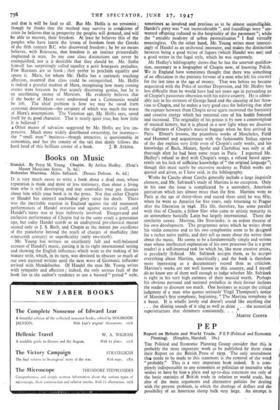Books on Music
Handel. By Percy M. Young. Chopin. By Arthur Hedley. (Dent's Master Musicians Series. 7s. 6d.) Bohuslav Martinu. Milos Safrinek. (Dennis Dobson. 8s. 6d.) IT is very much easier to write a book about a dead man, whose reputation is made and more or less stationary, than about a living man who is still developing and may contradict your pet theories about him while your book is in the press. Not that either Chopin or Handel has enjoyed undoudeth glory since his death. There was the inevitable reaction in England against the old mammoth performances of Handel oratorios and against oratorio itself, and Handel's name was at least indirectly involved. Exaggerated and exclusive performance of Chopin led to the same result a generation ago, but today Handel stands as an undisputed pre-classical master second only to J. S. Bach, and Chopin as the master par excellence of the pianoforte beyond the reach of charges of morbidity (late nineteenth century) or superficiality (early twentieth).
Mr. Young has written an excellently full and well-balanced account of Handel's music, putting it in its right international setting and showing the English influences which went to the making of his mature style, which, in its turn, was destined to obscure so much of our own national writinc until the next wave of Germanic influence arrived with Mendelssohn. Of Handel the man Mr. Young writes with sympathy and affection ; indeed, the only serious fault of the book lies in the author's tendency to use a bastard " period " style, sometimes so involved and precious as to be almost unintelligible. Handel's piety was "not inconsiderable ", and foundlings were "tin- wanted offspring reduced to the hospitality of the pavement "; while the "amiable modesty of urban pastoralisation" I find virtually meaningless. On the other hand, Mr. Young writes most interest- ingly of Handel as an orchestral innovator, and makes the distinction between being a good writer of fugues (which Handel was not) and a good writer in the fugal style, which he was supremely.
Mr Hedley's bibliography shows that he has the unusual qualifica- tion, necessary to a biographer of Chopin now, of knowing Polish. We in England have sometimes thought that there was something of an affectation in the patriotic fervour of a man who left his country for the last time at the age of twenty. That was before we became acquainted with the Poles of another Dispersion, and Mr. Hedley has less difficulty than he Would have had ten years ago in persuading us of Chopin's passionate obsession with his native country. He is admir- ably just in his estimate of George Sand and the sincerity of her rievo- lion to Chopin, and he makes a very good case for believing that after the rupture between them Chopin never again recovered the buoyancy and creative energy which her maternal care of his health fostered and increased. The originality of his genius is by now a commonplace of musical history, but it is placed in a new light when we discover the slightness of Chopin's musical baggage when he first arrived in Paris. Elsner's lessons, the pianoforte works of Moscheles, Field and Hummel and acquaintance with the fashionable Ifalian operas of the day explain very little even of Chopin's early works, and his knowledge of Bach, Mozart, Spohr and Cherubini was only at all thorough after he had been some years in Paris. I regretted Mr. Hedley's refusal to deal with Chopin's songs, a refusal based appa- rently on his lack of sufficient knowledge of " the original language"; though this must surely be excessive modesty as Polish works are quoted and given, as I have said, in the bibliography.
Works by Czechs about Czechs generally include a large jingoistic element, and Mr. Safranek's study of Martinu is no exception. Only in his case the issue is complicated by a secondary, American patriotism which jars almost more than the first. Martinu went to Paris at the age of thirty-three and stayed there until he was fifty, when he went to America for five years, only returning to Prague after the liberation in 1946. His life, therefore, has some parallel with that of Chopin, a fellow Slav who came to artistic maturity in an atmosphere basically Latin but largely international. There the similarity ceases. Martinu, like Stravinsky, is an ardent theorist of his own development. The programme notes which he writes about his violin concerto and to his two symphonies seem to be designed for a rather naïve public, and they tell us more about the writer than about the music. He seems to be a fundamentally simple and serious man whose intellectual explanation of his own processes (he is a great reader) is a self-imposed task for which he, like most creative artists, is peculiarly ill-fitted. Mr. Safranek accepts them, as he accepts everything about Martinu, uncritically ; and the book is therefore more interesting as a documentary record than as criticism. Martinu's works are not well known in this country, and I myself do no know any of them well enough to judge whether Mr. Safrinek is right in his very high estimate of their musical worth. Perhaps his obvious personal and national prejudice in their favour inclines the reader to discount too much. One hesitates to accept the critical judgment of a man who quotes seriously- Virgil Thompson's notice of Martinu's first symphony, beginning, "The Martinu symphony is a beaut. It is wholly lovely and doesn't sound like anything else . . . the shining sounds of it sing as well as shine . . . the acoustical superstructure that shimmers consistently. . . ."
MARTIN COOPER


































 Previous page
Previous page